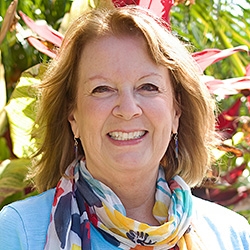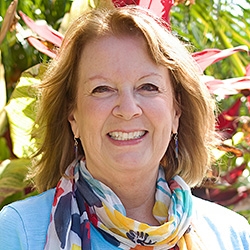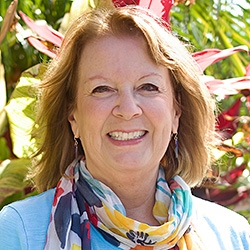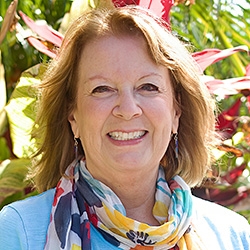

Search Results: giving
-
We only have this decade to make radical changes to avert crossing over into an unlivable Earth. What's essential is a critical mass of people with capacity to respond to many enormous, daunting social-environmental challenges. This means on a wider scale, responding to conflict, fear, hate, injustice and violence with the ability to see our commonality underlying our differences. And to feel part of a larger whole so we can birth natural caring, togetherness, and cooperation.
-
Judgment is an attempt to protect from hopelessness or insecurity, at high cost. Instead, check in with fear, grief, or hurt. Then wonder what needs are at stake for everyone. This makes space for grief instead of anger, for negotiation rather than control, and for "calling in" rather than excluding. Wonder: “For whom would this be life-serving or not?”, “What strategies would care for all needs?” or, “What can I contribute now?”
-
When a person of color (A.K.A. a person from the Global Majority, or GM) tells a marginalization story that triggers a defensive response from a white participant in a group, to foster awareness and healing, leaders can address the white person's distress with empathy, highlighting the common dynamic of prioritizing white pain. From there, leaders can offer GM participants opportunity to share their experience and make requests of the group.
-
So many of us have a habitual response of trying to eliminate uncertainty and the arrival of what we don't want. Alternatively, we can embrace the irreducible uncertainty of life. This shift from resistance and helplessness to mourning allows acceptance of outcomes, reduction of stress, and opens the door to noticing and appreciating what's present and available amidst challenges.
-
Greetings dear readers of the Growing Roots Newsletter! Mary Mackenzie invited me to be a guest writer for this issue to which I happily agreed. She also shared that her messages are typically more personal in nature, something I always appreciate in a newsletter. The challenge for me then is to...
-
Join Mary Mackenzie for this 8 session exploration of the Fundamentals of Nonviolent Communication.
-
What does nonviolence have to do with group facilitation?
Miki Kashtan believes that nonviolence is a way of being and living that orients us in all our thoughts, words and deeds toward the integration of truth, love and courage. All nonviolent individual and collective actions are aimed at preserving what serves life and challenging what does not. Facilitation is one clear path for bringing nonviolence to the world!
How can we act now, as facilitators, as if the world of our dreams, the Beloved Community, is already in place?
-
Come fall in love with yourself again…
In this course recording, facilitated by Arnina Kashtan, you will discover your ability to...
- Simply love yourself…
- Live fully and express your greatness in the world… and
- Shorten the way to realizing your true self!
Arnina will share with you the deepest process of self-connection and meaningful discovery. You will learn how to listen to your innermost self, discover how to lead a life that is much more than anything you have ever dreamed of, and fall in love with yourself all over again!
-
Fear in dealing with a neighbor's 'wastebasket talk.' Only leaving or interrupting stops the flow.
-
Expressing ourselves honestly is sometimes scary because we can't predict where the conversation will go after we've made ourselves vulnerable. This recording will demonstrate how the power of our honesty is enhanced by ending on a clear and present request.
-
Trainer Tip: Mary shares how staying present to our anger and finding the underlying feelings and needs can lead to deeper connection and more satisfying outcomes.
-
Trainer Tip: The exchange of resources, that is, exchanging money for an item or service, is enhanced and better appreciated when we are connected to its personal value rather than its cost.
-
Who does not want to be understood? In Tip #6, Eric shows you how to deepen connection and trust by checking your understanding with the person you are conversing with.
-
Join Eric Bowers in transforming past relationship pain, coming alive in community and creating thriving relationships. This 12 session Telecourse recording brings together Eric's passions for Nonviolent Communication, Attachment Theory and Interpersonal Neurobiology.
-
Do you sometimes feel overwhelmed – or locked into passivity? This course offers you a way out. Learn to change the way you perceive leadership, and you’ll help yourself respond more powerfully and proactively every day of your life – wherever you are – and whomever you’re with!
-
Trainer Tip: To reduce defensiveness and hurt feelings when talking to your partner about your sexual needs that haven't been met, keep the conversation focused on your needs, not her lack of skill, and make a very specific request. From there, you can both explore any shared needs, blocks, or support needed to bring you both closer to your needs.
-
Join Miki as she covers a lot of territory, defining leadership, helping us lead when we're not in the leadership chair, showing us how to have power in every moment and engage our fear instead of let it run us. Get some powerful leadership tools you can put to use today.
-
Most of us believe we are powerless at work – even if we’re the one “in charge.” This course offers you the opportunity to learn how to consciously change this mindset, and have a positive impact on workplace culture and attitudes along the way. Most of us believe we are powerless at work – even if we’re the one “in charge.” This course offers you the opportunity to learn how to consciously change this mindset, and have a positive impact on workplace culture and attitudes along the way.
-
Trainer tip: Notice how the exact same actions can stimulate different feelings depending on if your needs are met or unmet. So while what people say or do is the stimulus, the actual cause of our feelings comes from our met or unmet needs. Read on for more on this.
-
Understanding how our brains operate in relation to power, privilege and status is important if we wish to build a world that works for all. This article gives an overview of the brain tendencies we have in relationship to groups, and provides remedies to counteract the automatic labor-saving devices of our human brains (which often prevent us from seeing the fullness of others, and our own, humanity).

Quick Links
Subscription Preferences
Stay In Touch!
Looking for ways to keep up with NVC Academy news, get special offers, free resources, or words of inspiration? Here are five ways to stay engaged:




















